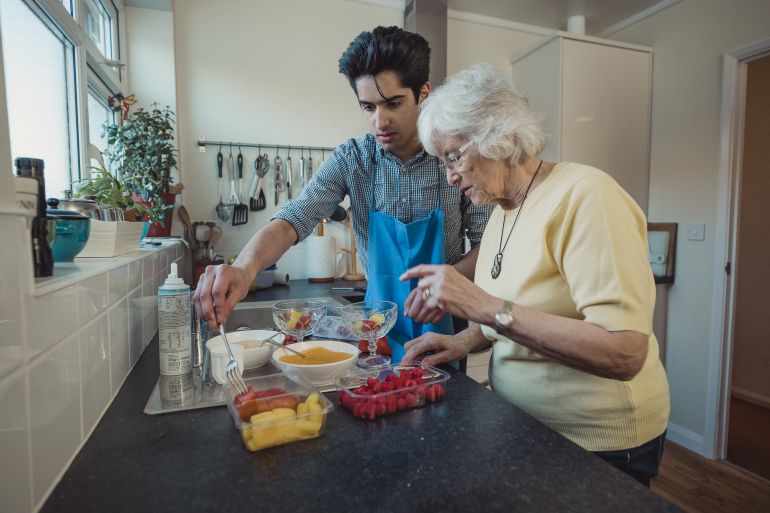By Allyson Nesmith, Digital Content Contributor
What does it mean to have a purpose? And how can we help young people cultivate their sense of purpose during adolescence?
These were questions tackled during our recent webinar, “Cultivating Purpose in Adolescence,” by panelists Anthony Burrow, PhD, Patrick Hill, PhD, Leslie Leve, PhD, and Jamila Walida Simon, MS. Joanna Lee Williams, PhD, Co-Director of the National Scientific Council on Adolescence (NSCA), moderated the discussion.
As outlined in a new council report from the NSCA, purpose is the feeling of direction in life that guides us day to day toward activities that matter to us. Many people tend to think of purpose as something that is “found”—that as part of growing up, young people go off into the world and discover a purpose awaiting them. But, youth do not just find their purpose as if it were an object already assembled. Rather, they cultivate their purpose through a process of discovering and actively exploring their unique interests, skills, and values.
Developing this sense of purpose is one of the key developmental tasks of adolescence. Research shows that there are many benefits to feeling a sense of purpose both mentally and physically.
“When young people cultivate a sense of purpose, greater health, well-being, social connection and resilience are evident, not to mention the potential contributions they make in the world as they pursue their valued aim,” said Tony. A sense of purpose is also highly interdependent with many other aspects of healthy adolescent development, including identity formation and pursuit of goals.
Youth can still experience these benefits even if they are unable to fully articulate what their purpose is yet. “There’s a lot of us, myself included, who might feel very purposeful, and still be trying to figure out how exactly to say, like, my purpose is X,” said Patrick. “That doesn’t stop all of the benefits.”
One way we can help youth cultivate their sense of purpose? “Notice,” said Jamila. “When do young people light up in a space? How can we then continue to encourage them to move along in a particular direction, or to explore that particular spark?”
Noticing when young people light up, and helping them follow that spark (Jamila called this being a “spark champion”) can also make the idea of purpose feel less overwhelming of an idea to grasp.
“If you start off with just, ‘I need to find a purpose in life,’ it’s way too daunting, and way too big of a thing for any of us to try to manage,” said Patrick. “So, especially when working with youth to help them cultivate this purpose, it’s really important not to give them this weighty, over-the-top thing to start with. Ask questions like, ‘What did you feel on this day?’ ‘What kinds of things gave you this direction during the day?’”
Another way to help young people cultivate their sense of purpose is by creating many different safe, healthy opportunities for them to try new things, take positive risks, and learn about themselves.
“It can be convenient to try to distill pathways to purpose down to three easy steps or to this pathway,” said Tony. “But, it seems to be characteristically true of purpose that people cultivate it, discover it, and find their way to it through a lot of different pathways.”
However, not all youth have access to the same opportunities to find their unique pathways to purpose. Policymakers and community leaders can help to reduce these inequities by ensuring that all young people have access to educational, extracurricular, and vocational opportunities, by providing financial resources to support adolescents in exploring their interests, and by prioritizing programs and policies that support families’ ability to provide an environment so they can support their own children discover their unique talents and contributions.
Sharing our own experiences of exploring our sense of purpose can be another useful tool for youth as they cultivate their sense of purpose.
“Every single time we’re running a program, we start by sharing what our story is,” said Jamila. “I think that those stories are incredibly powerful, and they allow for young people to sort of relax a little bit in their bodies as best as they can as adolescents, and start thinking about themselves and what they want for themselves.”
For more information on helping youth to cultivate their sense of purpose during adolescence, as well as the kinds of programs and policies that could help support all young people to discover their direction and how they want to contribute to the world, check out the National Scientific Council on Adolescence’s latest council report: https://developingadolescent.semel.ucla.edu/topics/item/purpose.
Key Takeaways
- Young people cultivate their sense of purpose—the feeling of direction in life that guides us day to day toward activities that matter to us—through a process of actively exploring their unique interests, skills, and values.
- A sense of purpose can give youth greater health, well-being, social connection, and resilience. Our communities also benefit from the potential contributions they make in the world as they pursue their valued aim.
- Youth can experience these benefits even if they are unable to fully articulate what their purpose is yet.
- Adults can help young people cultivate their sense of purpose by noticing what makes young people light up, providing multiple pathways for youth to explore their purpose, and sharing our own experiences of purpose.



